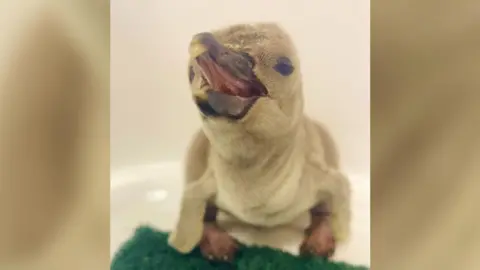Four penguin chicks hatch after breeding success
Four penguin chicks have hatched at a bird park in what has been described as its most successful breeding season in almost a decade.
All three of the established breeding pairs of Humboldt penguins at Birdland Park & Gardens in Bourton-on-the-Water, Gloucestershire, laid two eggs each, resulting in the park's largest clutch since 2017.
Birdland said this breeding season has been "especially significant" as the pairs - Pablo and Sunny, Broady and Kat, and Big Mac and Cookie - are all first time parents.
A fifth egg is said to be emerging, and a sixth is under close incubation.
Keepers removed one egg from each pair for artificial incubation to reduce pressure on the adult birds and increase the chances of survival.
Although one of their eggs was infertile, Big Mac and Cookie had a chick hatch on 26 May, weighing just 61g (2oz), making it one of the smallest chicks to be recorded at Birdland.
It has now grown to 787g (28oz) and is being fed three times a day. It will soon transition from formula to solids.
Birdland said Pablo and Sunny's nest-reared chick did not survive but the second hatched via artificial incubation at 91g (3oz).
Now 42 days old, it weighs 1.8kg (4lb).
 Birdland
BirdlandBirdland said its hand-reared chicks are fed a "carefully managed diet" of fish, squid, vitamins and salt paste, which is delivered via pipette and adapted as they grow.
"Humboldt penguins are listed as vulnerable in the wild due to habitat loss, climate change, overfishing and pollution," the park said.
"Birdland supports global conservation efforts, including a census in Peru carried out with Penguins International and plans for a staff member to join wild monitoring projects later this year."
The chicks are part of a programme contributing to the coordinated effort of safeguard the species for future generations.
Follow BBC Gloucestershire on Facebook, X and Instagram. Send your story ideas to us on email or via WhatsApp on 0800 313 4630.
